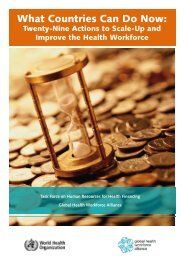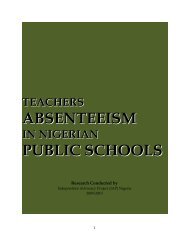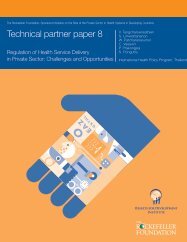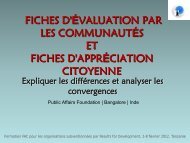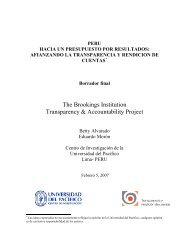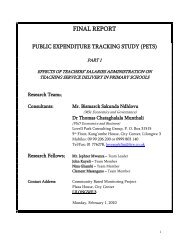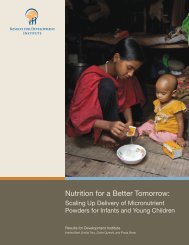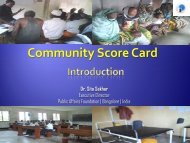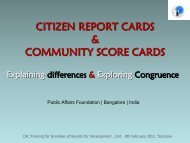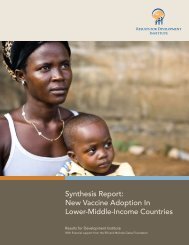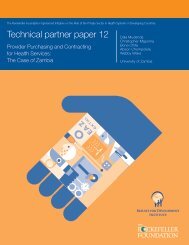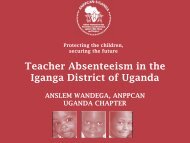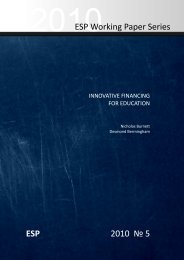Innovative Secondary Education For Skills Enhancement
Innovative Secondary Education For Skills Enhancement
Innovative Secondary Education For Skills Enhancement
You also want an ePaper? Increase the reach of your titles
YUMPU automatically turns print PDFs into web optimized ePapers that Google loves.
was expanded to Poland and Hungary in 2006. The PTS<br />
life skills curriculum is currently available in 12 languages<br />
and has been successfully tested in a variety of venues,<br />
including both public and private secondary schools, vocational–technical<br />
institutes, teacher training colleges, and<br />
youth-serving nonprofit organizations.<br />
A key measure of success of the program is the extent to<br />
which young people are either in school or employed six<br />
months after participating in the program. To date, more<br />
than 40,000 young people have completed the program<br />
in eight countries. Evaluations of the PTS program have<br />
shown it to have a significant impact among participating<br />
young people in four essential life-skills categories:<br />
personal development, problem solving, healthy lifestyles,<br />
and workplace success, as well as in reducing school<br />
dropout rates and increasing employment, and in helping<br />
at-risk youth increase their levels of self-confidence and<br />
hope for the future.<br />
Youthreach conducted a follow-up survey with 374 youth<br />
participants six months after they graduated from the<br />
program to track their progression. This survey found<br />
that 58 percent of respondents were continuing with their<br />
vocational skills training after attending the PTS program,<br />
and 38 percent had either found a job/internship or started<br />
their own enterprise. The majority of youth who found<br />
employment after graduating from the program indicated<br />
that they are performing better at their job, working more<br />
effectively in teams, and better understand how to behave<br />
in an office setting as a result of the PTS training.<br />
Multi-Skill Vocational Training and<br />
Entrepreneurship Development As<br />
Part of <strong>Secondary</strong> <strong>Education</strong> (India)<br />
Lend-a-Hand India implements a program in governmentaided<br />
schools that is a blend of traditional academic work<br />
and hands-on projects that emphasize relevant skills<br />
students need in rural areas.<br />
Approach. The Lend-a-Hand program works to make the<br />
secondary school curriculum more relevant to the rural<br />
environment. Subjects such as basic engineering, energy,<br />
the environment, agriculture, animal husbandry, and<br />
home and health science are introduced, complementing<br />
existing curriculum subjects such as mathematics and science.<br />
Students are also trained in practical business skills<br />
such as timeliness, calculating costs, marketing and selling<br />
their products locally, and ascertaining profits.<br />
<strong>For</strong> these vocational and entrepreneurship courses,<br />
instructors are recruited from within the local community<br />
workforce. Lend-a-Hand works with the school<br />
management to identify and train instructors, who are<br />
typically local microentrepreneurs in the identified fields.<br />
In addition to monetary incentives, these microentrepreneurs<br />
also receive an opportunity to undertake additional<br />
work orders received by the school from the community,<br />
appear for open school diploma examinations, and access<br />
networks to expand their business.<br />
Scale and Impact. Lend-a-Hand has been so successful<br />
that it has been recognized formally as a full credit course<br />
by the government of Maharashtra. Attendance levels in<br />
schools where the program is implemented have reached<br />
almost 100 percent. In a recent survey conducted with<br />
1,200 students who graduated, more than 20 percent stated<br />
they would like to start their own venture after they<br />
complete their further studies. The program is currently<br />
planning to expand to Gujarat and Orissa states in 2012,<br />
but it remains to be seen if the quality of the program can<br />
be maintained as the program is brought to scale.<br />
Cost and Sustainability. Lend-a-Hand India has established<br />
a sustainable grassroots model that capitalizes<br />
on existing infrastructure and resources to achieve scale<br />
and sustainability, partnering with government schools,<br />
pervasive in rural India, to implement this approach. It<br />
contributes to approximately 80 percent of the initial<br />
costs, and the schools are required to invest the remaining<br />
20 percent. Pursuant to such commitment, the school<br />
management makes arrangements for space and infrastructure<br />
necessary to launch the program. By integrating<br />
skills-based education within the mainstream regular education,<br />
using local resources (local microentrepreneurs as<br />
trainers), customizing the curriculum to local conditions,<br />
and having the program largely implemented and run by<br />
the local schools, the model is relatively low cost.<br />
The program is currently supported by individual and<br />
corporate donations, marathon teams, and fundraising in<br />
international chapters. However, self-sustaining financing<br />
methods are being introduced in the form of monthly fees<br />
from students, income-generating activities carried out by<br />
students, in-kind contributions from local private enterprise,<br />
government grant schemes, and fundraising from<br />
the alumni network.<br />
52 <strong>Innovative</strong> <strong>Secondary</strong> <strong>Education</strong> <strong>For</strong> <strong>Skills</strong> <strong>Enhancement</strong> (ISESE)



